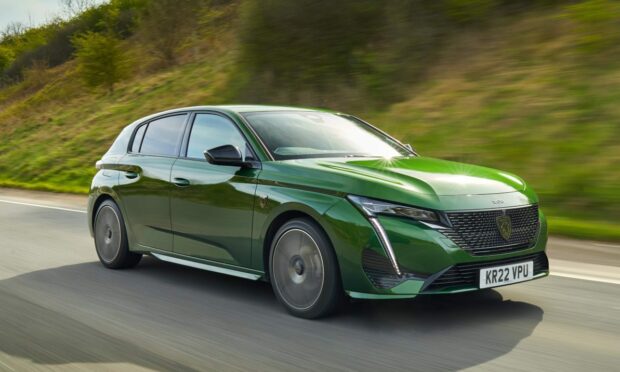I was never much good at maths. I wish I’d paid more attention at school and never imagined that many decades later, geometry would come back to haunt me.
In my youthful innocence I didn’t comprehend the link between acute or obtuse angles and car design but it’s become all too clear now.
That’s down to the latest 308 hatch from French brand Peugeot who’ve done a brilliant job in combining sharp angles with sweeping curves to create one of the best-looking new cars to emerge out of lockdown.
Design with bold new lines
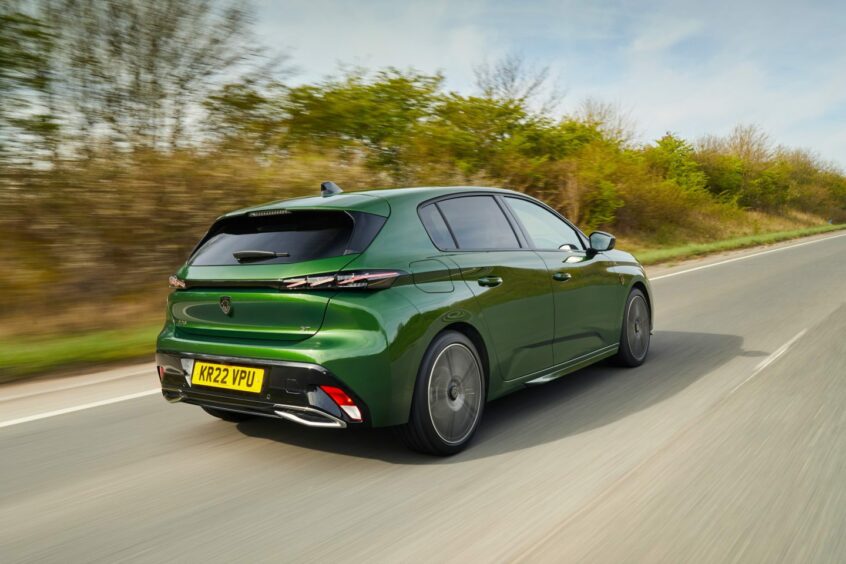
From the outside, the car, both in hatch or SW estate version, is a smart addition to the landscape, especially in the Olivine Green paintjob of the test car, one of the seven dramatic colour options on offer.
It has flowing lines, a forceful front and a very neat back end but step inside and there the view changes to a geometric one with pointed corners and what I’ve discovered since my schooldays is a trapezoidal theme.
For fellow uneducated types, that is a flat geometric figure with four sides but unlike a square, with only two sides parallel.
The result is a very stylish look across the width of the car’s dash, which oozes clean efficiency.
Easy-to-use functions
For the driver, the eye-level 10-inch digital instrument cluster gives clear information and in the case of the GT test car it’s a 3D display which could be over-complicated but is superbly crisp and concise.
It has several modes which can be configured and customised for the TomTom navigation, media sources, safety driving aids and energy flow.
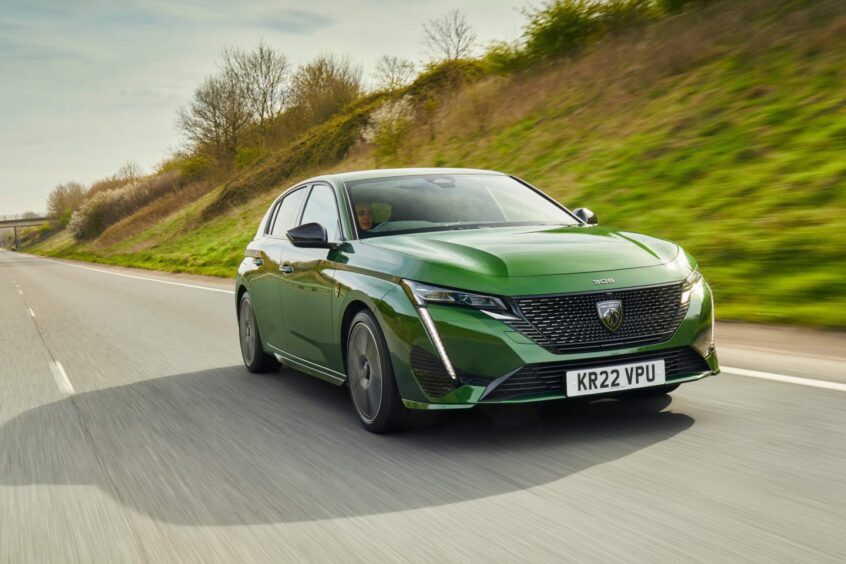
Central to it is the Peugeot trademark small multi-function steering wheel, which includes sensors to detect the driver’s grip levels when using driving aids and fingertip controls for the radio, media and phone.
The air vents are positioned high on the dash which means the central touch screen, slightly lower than the digital cluster, is closer to the driver’s hand and eye line.
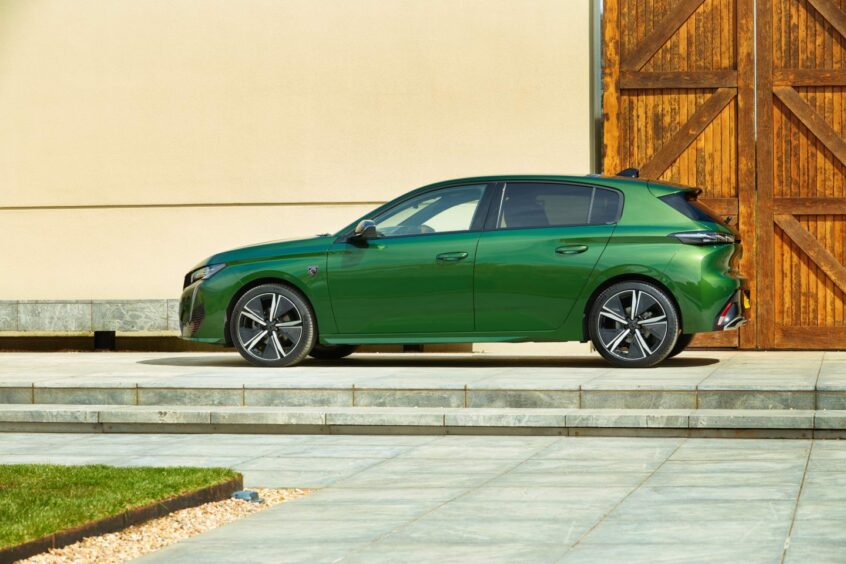
The upper grades come with configurable virtual i-toggles alongside the central screen which are touch-sensitive for a shortcut to various functions, including the air conditioning and phone contacts and to launch an app and avoid the need to scroll through a menu.
Driving modes and voice commands
The car’s dynamic controls have impulse selection of reverse, neutral or drive and the driving style selector for the modes of Electric, Hybrid, Eco, Normal and Sport depending on the model and powertrain.
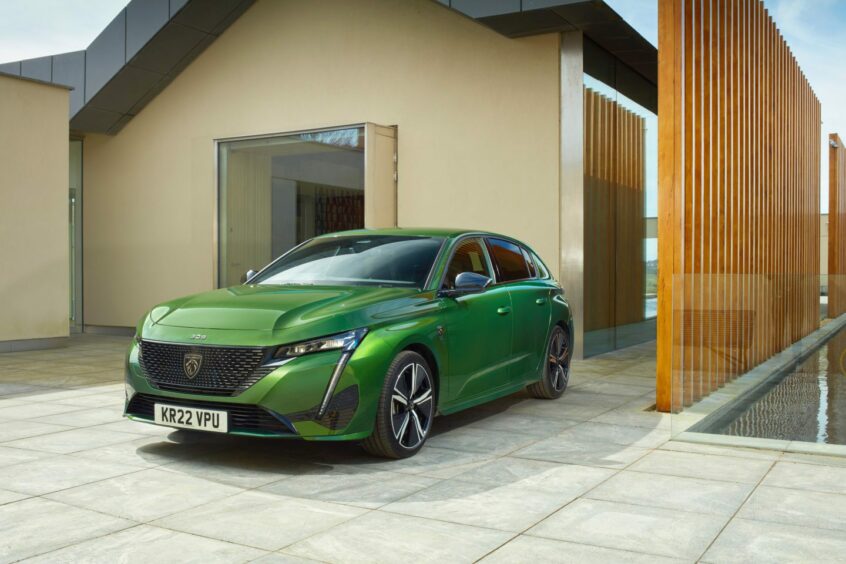
The voice command system uses speech recognition for hands-free access to many of the functions, although I found that summoning it with the ‘OK PEUGEOT’ command failed to get me anywhere.
That could have been down to my Scottish accent or the fact that it was one of the first models to arrive from the factory and was still in Gallic mode with the speed set in kilometres an hour and the satnav directions in French.
Inside the cabin
The a/c constantly monitors the quality of air entering the cabin and the top models have an air treatment system that automatically filters out polluting gases and particles.
The design, technology and finish of the interior all come together for a superb working environment for the driver.
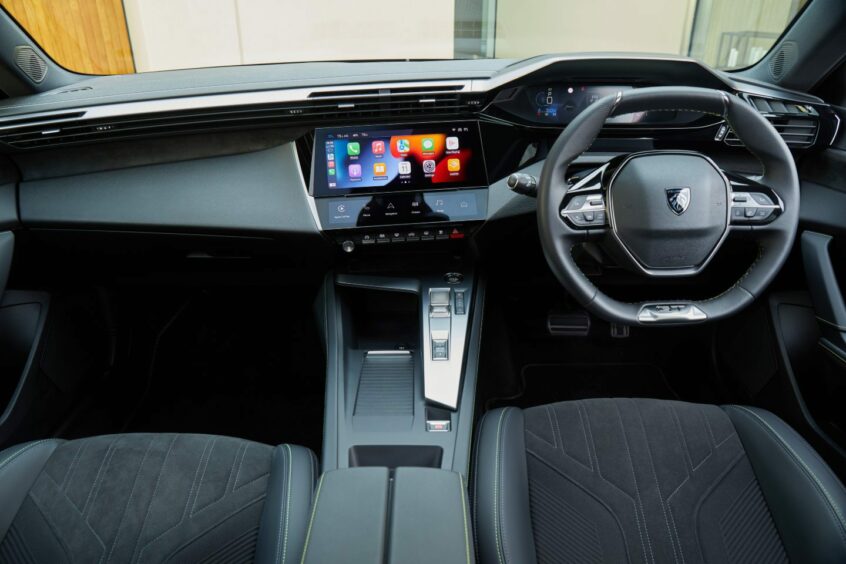
The new 308 is the first to display Peugeot’s new brand logo on the boot lid and grille – hiding the radar sensor – retaining the lion theme but as a roaring head rather than a full animal.
It’s a clear statement of the company’s fresh approach to the future where four new models are on the near horizon and the entire range will have an electric element by 2025.
Five trim options
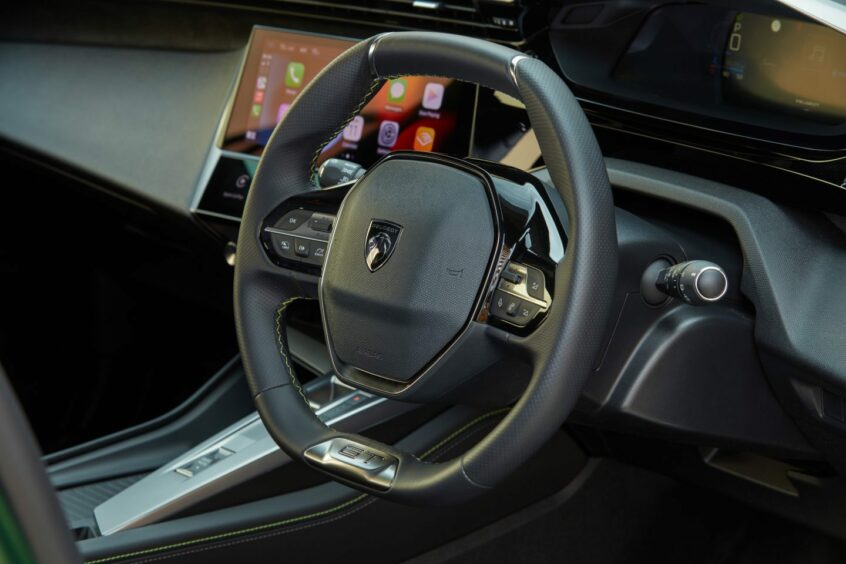
There are five trim levels and four power options – two plug-in hybrids with up to 37 miles of electric range, a 1.2 litre petrol engine, which was in the featured car, and a 1.5 litre diesel. There should be a full electric version next year.
It’s longer than the previous model which means there’s more room for passengers in the back.
LED headlights are standard across the range with vertical daytime running lights while the taillights have full LED technology and the iconic three-claw signature.
On the road, the car has a great stance and looks much more significant than the outgoing model and while the three-cylinder petrol engine in the test car was remarkably capable, it sounded surprisingly noisy at low speeds when extra oomph was called upon.
It felt fully confident on the road and the eight-speed auto box was a delight.
308 buyers will be attracted by excellent residual values when they come to trade-in their car
Aerodynamics have featured heavily in the design of the new car. All the bodywork like bumpers, body pillars, door mirrors, elongated roof spoiler and even the wheels have been styled for improved airflow.
The boot has a useful 412 litres of capacity, with 28 litres of storage in a hidden compartment beneath the floor. With the rear seats folded flat, that increases to 1,323-litres.
The new 308 will be available to order from retailers and online later this year. The hatch version will account for around 75% of sales and the majority will be to fleet customers.
Almost all retail customers will be getting their cars on personal contracts and they’re generally from younger households with an urban lifestyle.
It’s a competitive area of the market with alternatives like the VW Golf or the Seat Leon but 308 buyers will be attracted by excellent residual values when they come to trade-in their car or replace it on their PCP deal.
I suspect many will be reluctant to change what is a good looking piece of kit which with all the latest technology, is pretty clever too.
The Facts
Model: Peugeot 308 GT Puretech 130 Auto
Price: £29,920 (£30,620 as tested)
Top speed: 130mph
0-62 mph: 9.7 seconds
Economy: 52 mpg
CO2: 134 g/km
